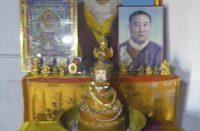
High Peaks Pure Earth has translated the second (and final) part of this piece by Woeser originally written for the Mandarin service of Radio Free Asia and published on her blog on October 14, 2017.
In this part, Woeser looks further into the question of Sino-Tibetan exchange, notes the growing interest among Chinese people in Tibetan Buddhism and also introduces us to the recent history of the Lhagyari family. Read more about the Lhagyari family over on Treasury of Lives.
Read Part One of the essay here: http://highpeakspureearth.com/2017/the-scissors-woman-freedom-of-speech-and-sino-tibetan-exchange-etc-part-1-by-woeser/
“The Scissors Woman, Freedom of Speech and ‘Sino-Tibetan Exchange’ etc.” (Part 2)
By Woeser
Secondly, why would this woman behave this outrageously arrogantly and bossy in Dharamsala? Did she not know that this isn’t only the centre of the Tibetan exile community, but also within the national borders of India? This is not Lhasa, it is not that Lhasa that the 14th Dalai Lama had to escape from; but she dares to tyrannise people like a coloniser who holds all the power in her hands. After the incident, a friend wrote the following comment on Facebook: “Where there is no respect there is no safety.” Just as the Member of Parliament, the President of the Gu Chu Sum Movement, Lhagyari Namgyal Dolkar, who had been attacked by the woman said later during an interview: “In any case, it is really unimaginable that this kind of incident happened in front of Tsuglakhang, and that it happened in front of a Tibetan memorial monument. Speaking for myself at least, this incident really opened my eyes, even in Dharamsala this kind of thing can happen!” This MP is a young woman, a descendant of a Tibetan Tsanpo (sovereign King); her father Lhagyari Trichen Namgyal Gyatso was thrown into prison for 20 years in 1959 by the CCP accused of collaborating with “rebels”. Many members of the royal family were imprisoned or died in misery and the Lhagyari Palace, this place with hundreds of years of history, was turned into ruins. It is a coincidence that I have recently been sorting through the photos I took of the Palace ruins many years ago as well as photos taken by a photographer friend earlier this year; there is a feeling of continuity and overlap here that turns this incident into a metaphor.
What is even more thought-provoking is the fact that when discussing this issue on Facebook, there were some Tibetans who tried to prevent greater quarrels and said “forget about it”, so that it wouldn’t impact “Sino-Tibetan exchange”. This, on the other hand, made me wonder: what exactly do we mean by “Sino-Tibetan exchange?” Or rather, what should “Sino-Tibetan exchange” look like? As everyone knows, His Holiness the Dalai Lama has made great efforts to advocate “Sino-Tibetan exchange,” but he has encountered many many setbacks and humiliations that a spiritual leader, a religious figure and wise man like him should never encounter; frankly, we Tibetans could hardly bear seeing this. Whenever I think of this, I feel deep pain. Of course, I am not saying that we do not need any “Sino-Tibetan exchange.” In fact, there are many people who engage in it. Including myself, because I use Chinese to write about Tibetan problems. What I do want to say, however, is that “Sino-Tibetan exchange” needs to have some basic principles, it needs to have a bottom line and not be like turning the other cheek after having been slapped in the face. What I want to say is that “Sino-Tibetan exchange” needs to be established on the basis of mutual respect and equality; without blindly following the other, not because one simply wants to win over some people, not because one wants to get some benefits from the other, like money or fame. To put it frankly: “Sino-Tibetan exchange” has to be done by every single Tibetan; but how much have we done? Yet, the problems Tibetans face today are imposed by outsiders and, at the same time, also self-inflicted. The kind of “Sino-Tibetan exchange” that exile Tibetans engage in, is, in my view, nothing to be proud of. Selfishness is one reason for this, some people simply pursue their own benefits at the expense of greater accomplishments.
Thirdly, in recent years, there are more and more Chinese people, from Beijing, Shanghai, Chengdu or Hangzhou, who are interested in Tibetan Buddhism. Travelling to Tibet has become a fashion. Many people are chasing after Lamas like they are after stars. Also, despite the restrictions imposed by the government, many Lamas and Rinpoches are happily travelling across the country, because they get to pass on their teachings and also because they receive gifts and offerings in return. Foreign media have asked me several times: will the increase in Chinese interest in Tibetan Buddhism help solve the “Tibet issue”? I think that this argument is too superficial, too optimistic. From what I know and have observed, many Chinese people who take an interest in religion and even become Tibetan Buddhists have not much knowledge of or interest in the historical or contemporary “Tibet issue” and they have even greater misunderstandings regarding the Dalai Lama. And this is not entirely a result of CCP brainwashing.
A Chinese friend who lives in Germany said on Twitter: “The Chinese followers of Tibetan Buddhism that I have met abroad are generally not very interested in the Tibetan people’s fate. What I don’t understand until today: They are deeply thankful towards their own Tibetan lamas, how can they at the same time be so ignorant towards other Tibetans?” A friend explained: “Unless you ask them directly, most Tibetans don’t take the initiative to talk about their suffering; and if you ask, they will talk about it, but not in the same exaggerated and whining way in which Chinese do it…” I think differently about this. It is not that Tibetans don’t take the initiative to talk about their suffering, it is more related to Tibetan people’s self-control, to the point that they have got used to censoring themselves, to silencing themselves, even if it is against their will. Regardless of whether it is Lamas or Rinpoche in Tibet, in the exile community, in Amdo or Lhasa, they hardly ever talk to their Chinese students about the reality in Tibet, they don’t talk about Tibet’s historical truth. This, of course, stems from political sensitivity and fear; they just don’t want to provoke trouble. So they simply recite texts, they pass on their teachings and they accept gifts and offerings. There are some monasteries in Tibet that have been refurbished magnificently because of the money given by Chinese followers. Giving too much money, to the point that these followers would be particularly catered to, in fact, also contributes to the arrogance of those who think that money is everything.
It is for this reason then that it is by no means strange that in India, in Dharamsala, in front of the Dalai Lama’s temple, a Chinese woman would appear and destroy commemorative photos and attack Tibetans with a pair of scissors. Even though she said that she was a follower of His Holiness, it is really as an unknown friend wrote on Facebook: “For all followers of His Holiness this incident is extremely upsetting and sad. Just as you stated in your interview, His Holiness is such a venerable, wise and merciful person, but these people are unable to follow his enlightenment and bring shame through their viciousness. His Holiness’ teachings are far more advanced than those of younger lamas. His teaching is helping us study and understand many things; every time we hear him, we feel we immediately gain some refreshing new wisdom, this is really not something an ordinary person can achieve. If followers fanatically follow a so-called Guru and don’t observe for themselves, however, then some really extremist actions might be the consequence.”
What needs to be emphasised, however, is that not all Chinese Buddhists are like this. In my own life, there are many good friends who enlighten and help me, many of whom are genuine followers of Buddhism, they practice Buddhism, quietly moving ahead, reaching a state of sober knowledge and correct views.






Powerfully said. I guess all I can say is that I notice a small sincere sector of young Chinese people here are concerned about China and CCP influence in Australia (I fear for my nation’s complacence in the face of blatant takeover of whole cities) and have asked me to arrange dialogues at Universities.